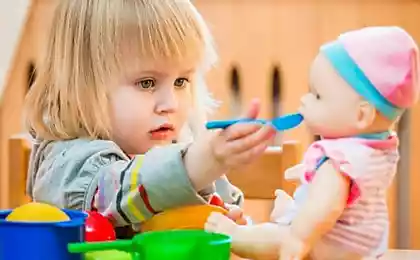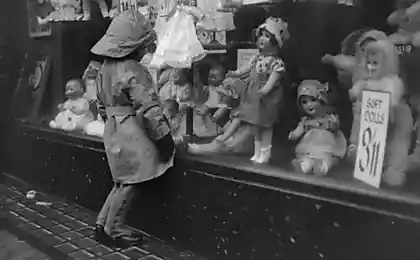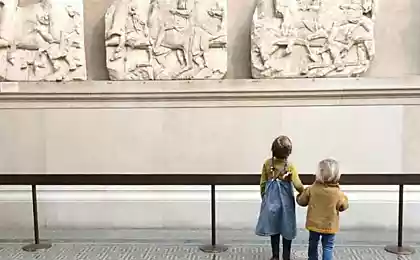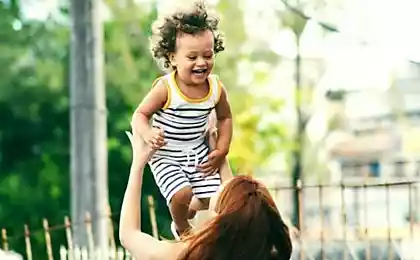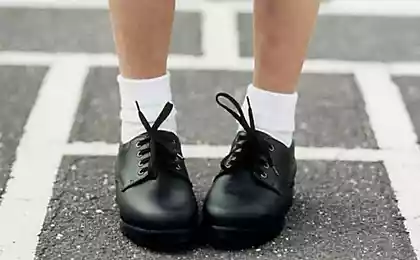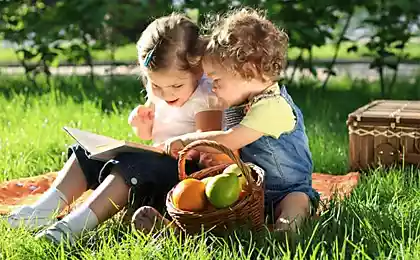510
Child – stingy: don't give your child a disservice!
In the period of early childhood is dominated by subject-manipulative activity. When the child interacts with objects, he knows not only their properties but also their own capabilities and abilities. Thus is formed the notion of the self, the image of "I".
The development of self, feeling as individuals is closely linked to the emergence of a sense of ownership. The child sees their stuff as part of your image. Therefore, any encroachment on the property meets the "fight".

The child defines the notion of "their" things, if he interacts with them. For example: a mother with a baby still on the walk or in the game center, and the child took some things proposed for the game, if for him to step up and take these things, it will soprotivlyatsya and to defend their own right to them (although they do not belong). On this basis, the kids take any toys from the other – thus, they are trying to do these things "private" to Express their right to them.
Everyone is familiar with the pattern: baby doesn't want to give his toy to someone else, but the parents insist that "we Need to share! Are you greedy? Then nobody would play!".In this case, they provide your child a disservice, and destroy the nascent necessary qualities.
First, they inspire the child that unconditional love is impossible – only if it will comply with the requirements of others, they will be positive to treat it ("if you don't give you no one will play!"). This is a very dangerous stereotype – thus, the child asserts in the "trade" relations in the sphere of feelings and affections, and devalued as a person. After all, will play only if you have any toys you give them, and not you as a person!
Kids often hear from parents: "it is not good to be Greedy!" but it is totally inappropriate that word. The child is only defending his property. If he can't learn to do it, what to expect in the future? He will grow up helpless, not able octoate their rights, to protect a loved one, become too compliant. In this case the person doesn't understand you can break up easily and effortlessly, and that should be "defend". So formed adult, not able to defend the honor of the family, or a loved one.
Why should the child leave with their belongings at the request of others? If you will approach on the street by a stranger and asked your car you borrow for a week for a ride? Exactly perceives this requirement and a child. You don't think to give their personal belongings to the first comer, the same right there with the baby!
Of course, you have a different system of values. You wonder why he's "stranglehold" grabbed an old plastic shovel or badly battered Teddy bear. And even more strange, when the child protects just raised from the ground a pebble or a stick – what's the problem, get another and give it to the boy!
We say to the child: "This Pope is not allowed to touch! Do not take it mom!". We are accustom it to the fact that the property of others must be respected. But why do we make such an exception for him? Doesn't he deserve the same respect? Besides, adults and children have different opinions of things – for us it is a thing and nothing more, and for a child, as we have already mentioned – is a part of him.
Especially become dear to own things, if the child is experiencing stress (for example, recently I went to kindergarten), then the meaningless little things like old tins become "moral support" in a difficult moment. In such situations, in any case, no need to force him to share his things, to even temporarily give up their toys.
Too bad if the parents side with the "offender", and talk your baby "have to share". The child comes to you seeking protection, even if he made a decision with which you disagree, don't reject him. Try to stand in his place: came a stranger (or unfamiliar) people, wants to take away a valuable thing. The mother (or other powerful adult) instead of having to rush to the aid and defend values, quietly give it to someone else.
If you see that favorite toy your baby can create a stressful situation – don't show it to guests and do not take for a walk. The child is still not able to resolve such a complex task. Other kids can't cope with it. It turns out that "play" the parents decide what to whom and how to give.
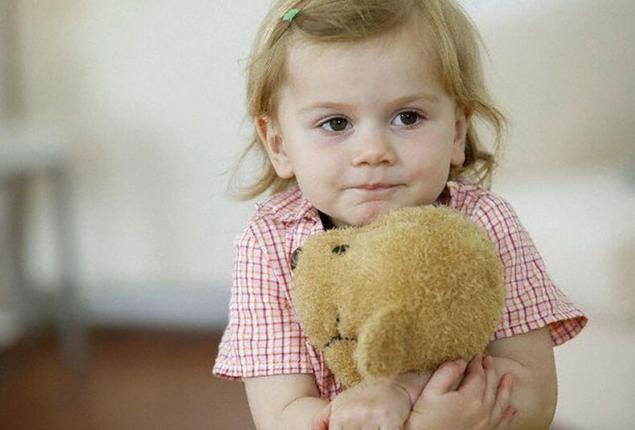
The parents of the child of younger age – unshakeable authority, regardless of their moral behavior. The child easily adopts the necessary moral values, but only if he sees the confirmation in the behavior of the parents. If we are trying to foster in the child respect for the property of others, the first thing you need to pay attention if he has any respect for her? If we support the respect? Shielded if an emerging sense of ownership, or tearing, as a useless weed?
Of course, every parent often faces the opposite behavior of others. But in any situation mother and father can show a child that the "laws of ownership" remain. For example, walk your child who takes toys, or just comes and takes without asking. Will definitely join – it is just a case where you can't wave a hand and say "let them understand".
Of course, to explain to other parents that grabbing the wrong things when they please, is inefficient. But the approaching "offender" to explain it is necessary – not even for himself, but for your own child that is waiting for your confirmation that the world is not destroyed, all the laws are, and you're on his side. And in the reverse situation to demonstrate respect to the property.
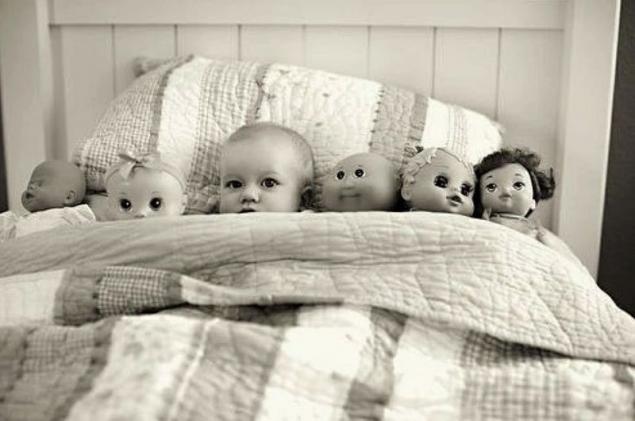
For example, if your child wanted to take someone else's toy, you help him ask politely, and explain that she could not give, and this right the other person must also be considered and respected. You can always have in stock the Arsenal "vyruchalochka" – such interesting items answering your child from other people's things.
Usually ladies handbag turns into a warehouse with the baby, so mothers it will not be difficult to offer children something interesting. Good advice: take the balloons (they take up very little space, and at the right time they can puff and play), a piece of paper – to make any figure of origami, colorful beads, crayons and other pleasant things.
The right of ownership, as well as in everything else, we rely on the law of "start with yourself". And if the little person does not start to respect yourself and your property, do not be surprised in the future, why this respect does not appear to others.
In the development of feelings of ownership may be the other extreme. When the child actually becomes "greedy"? For example, when accustom to this parents. Of course, we should not think that they are told bluntly: "don't tell Anyone their toys." (though such cases are). But often you can hear such warnings: "eat soon, and then the dog will eat!" (it is worth noting that forcing a kid to eat is not necessary by any means, it is fraught in the future not only health problems but also psychological difficulties, and serious problems with appetite should be addressed by a psychologist, not a nutritionist).
Are you familiar with the following exclamation: "If you throw toys – give them to someone else boy!", "Break machine – give all your toys in kindergarten"? Parents don't think about the fact that all the words children understand literally, learn, and soon these "germs" will grow "fruit" unpleasant surprises mom and dad.
Oddly enough, parents can "dedicate" the child or that the quality. Very often, unfortunately, in any reluctance of the child to "share", immediately put a "shortcut": "You are greedy! Ugh, it is ugly! You are stingy!". With this approach, the child quickly "surrenders", it ceases to be protected in the future I will try to conform to the negative characteristics of parents – this applies to any "labels": "stupid, slow, messy, whiny, stupid" and so on. To call the child such words – the best way to educate these qualities.
Another common cause – the child reflects the parents ' behavior. Not always parents can see for themselves the shortcomings, which are continued in their children.
It should be noted that when the child provokes the other kids that doesn't want to give them your stuff, causing tears and even fights. Parents need to be sensitive and try to discern when it really is impossible to give the thing even for a short time, and when the child intentionally annoys his friend or younger brother.
See also: Emotional disabilities — victims family education
Unpopular about motivation. Why the child does not learn?
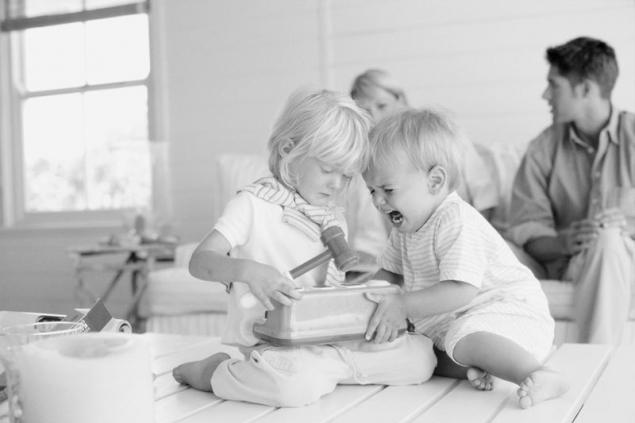
When you should pay special attention to the child's relationship to property:
P. S. And remember, only by changing their consumption — together we change the world! ©
Join us in Facebook , Vkontakte, Odnoklassniki
Source: deti-v-semje.livejournal.com/261552.html
The development of self, feeling as individuals is closely linked to the emergence of a sense of ownership. The child sees their stuff as part of your image. Therefore, any encroachment on the property meets the "fight".

The child defines the notion of "their" things, if he interacts with them. For example: a mother with a baby still on the walk or in the game center, and the child took some things proposed for the game, if for him to step up and take these things, it will soprotivlyatsya and to defend their own right to them (although they do not belong). On this basis, the kids take any toys from the other – thus, they are trying to do these things "private" to Express their right to them.
Everyone is familiar with the pattern: baby doesn't want to give his toy to someone else, but the parents insist that "we Need to share! Are you greedy? Then nobody would play!".In this case, they provide your child a disservice, and destroy the nascent necessary qualities.
First, they inspire the child that unconditional love is impossible – only if it will comply with the requirements of others, they will be positive to treat it ("if you don't give you no one will play!"). This is a very dangerous stereotype – thus, the child asserts in the "trade" relations in the sphere of feelings and affections, and devalued as a person. After all, will play only if you have any toys you give them, and not you as a person!
Kids often hear from parents: "it is not good to be Greedy!" but it is totally inappropriate that word. The child is only defending his property. If he can't learn to do it, what to expect in the future? He will grow up helpless, not able octoate their rights, to protect a loved one, become too compliant. In this case the person doesn't understand you can break up easily and effortlessly, and that should be "defend". So formed adult, not able to defend the honor of the family, or a loved one.
Why should the child leave with their belongings at the request of others? If you will approach on the street by a stranger and asked your car you borrow for a week for a ride? Exactly perceives this requirement and a child. You don't think to give their personal belongings to the first comer, the same right there with the baby!
Of course, you have a different system of values. You wonder why he's "stranglehold" grabbed an old plastic shovel or badly battered Teddy bear. And even more strange, when the child protects just raised from the ground a pebble or a stick – what's the problem, get another and give it to the boy!
We say to the child: "This Pope is not allowed to touch! Do not take it mom!". We are accustom it to the fact that the property of others must be respected. But why do we make such an exception for him? Doesn't he deserve the same respect? Besides, adults and children have different opinions of things – for us it is a thing and nothing more, and for a child, as we have already mentioned – is a part of him.
Especially become dear to own things, if the child is experiencing stress (for example, recently I went to kindergarten), then the meaningless little things like old tins become "moral support" in a difficult moment. In such situations, in any case, no need to force him to share his things, to even temporarily give up their toys.
Too bad if the parents side with the "offender", and talk your baby "have to share". The child comes to you seeking protection, even if he made a decision with which you disagree, don't reject him. Try to stand in his place: came a stranger (or unfamiliar) people, wants to take away a valuable thing. The mother (or other powerful adult) instead of having to rush to the aid and defend values, quietly give it to someone else.
If you see that favorite toy your baby can create a stressful situation – don't show it to guests and do not take for a walk. The child is still not able to resolve such a complex task. Other kids can't cope with it. It turns out that "play" the parents decide what to whom and how to give.

The parents of the child of younger age – unshakeable authority, regardless of their moral behavior. The child easily adopts the necessary moral values, but only if he sees the confirmation in the behavior of the parents. If we are trying to foster in the child respect for the property of others, the first thing you need to pay attention if he has any respect for her? If we support the respect? Shielded if an emerging sense of ownership, or tearing, as a useless weed?
Of course, every parent often faces the opposite behavior of others. But in any situation mother and father can show a child that the "laws of ownership" remain. For example, walk your child who takes toys, or just comes and takes without asking. Will definitely join – it is just a case where you can't wave a hand and say "let them understand".
Of course, to explain to other parents that grabbing the wrong things when they please, is inefficient. But the approaching "offender" to explain it is necessary – not even for himself, but for your own child that is waiting for your confirmation that the world is not destroyed, all the laws are, and you're on his side. And in the reverse situation to demonstrate respect to the property.

For example, if your child wanted to take someone else's toy, you help him ask politely, and explain that she could not give, and this right the other person must also be considered and respected. You can always have in stock the Arsenal "vyruchalochka" – such interesting items answering your child from other people's things.
Usually ladies handbag turns into a warehouse with the baby, so mothers it will not be difficult to offer children something interesting. Good advice: take the balloons (they take up very little space, and at the right time they can puff and play), a piece of paper – to make any figure of origami, colorful beads, crayons and other pleasant things.
The right of ownership, as well as in everything else, we rely on the law of "start with yourself". And if the little person does not start to respect yourself and your property, do not be surprised in the future, why this respect does not appear to others.
In the development of feelings of ownership may be the other extreme. When the child actually becomes "greedy"? For example, when accustom to this parents. Of course, we should not think that they are told bluntly: "don't tell Anyone their toys." (though such cases are). But often you can hear such warnings: "eat soon, and then the dog will eat!" (it is worth noting that forcing a kid to eat is not necessary by any means, it is fraught in the future not only health problems but also psychological difficulties, and serious problems with appetite should be addressed by a psychologist, not a nutritionist).
Are you familiar with the following exclamation: "If you throw toys – give them to someone else boy!", "Break machine – give all your toys in kindergarten"? Parents don't think about the fact that all the words children understand literally, learn, and soon these "germs" will grow "fruit" unpleasant surprises mom and dad.
Oddly enough, parents can "dedicate" the child or that the quality. Very often, unfortunately, in any reluctance of the child to "share", immediately put a "shortcut": "You are greedy! Ugh, it is ugly! You are stingy!". With this approach, the child quickly "surrenders", it ceases to be protected in the future I will try to conform to the negative characteristics of parents – this applies to any "labels": "stupid, slow, messy, whiny, stupid" and so on. To call the child such words – the best way to educate these qualities.
Another common cause – the child reflects the parents ' behavior. Not always parents can see for themselves the shortcomings, which are continued in their children.
It should be noted that when the child provokes the other kids that doesn't want to give them your stuff, causing tears and even fights. Parents need to be sensitive and try to discern when it really is impossible to give the thing even for a short time, and when the child intentionally annoys his friend or younger brother.
See also: Emotional disabilities — victims family education
Unpopular about motivation. Why the child does not learn?

When you should pay special attention to the child's relationship to property:
- if the child is older than four years, and never under any circumstances agree to rent your stuff;
- sensitive to the slightest change in the order of things and likes to always standing on the ground;
- on the contrary, a child older than three years never protects his stuff, he has no personal favorite things;
- committed to "bribe" others by gifting their own things;
- intentionally takes away someone else's stuff, razzadorila other children, causing fights and brawls.published
P. S. And remember, only by changing their consumption — together we change the world! ©
Join us in Facebook , Vkontakte, Odnoklassniki
Source: deti-v-semje.livejournal.com/261552.html
How to choose a good water filter at the cottage: a comparative review units
BMW announced the sales of hybrid i8 with laser lights












